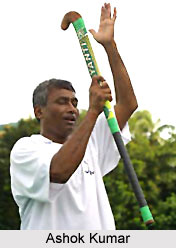 Ashok Kumar, son of hockey ace Dhyan Chand, benefited instant popularity. To him it was so stupendous task to contend him with his father. It was challenging and disturbing for him too. In the year 1974, when Ashok Kumar was conferred the Arjuna Award, he brought a state of high honour to his family. The winning goal was scored by him one year later against Pakistan to achieve India`s lonesome successful ending of that tournament in the World cup.
Ashok Kumar, son of hockey ace Dhyan Chand, benefited instant popularity. To him it was so stupendous task to contend him with his father. It was challenging and disturbing for him too. In the year 1974, when Ashok Kumar was conferred the Arjuna Award, he brought a state of high honour to his family. The winning goal was scored by him one year later against Pakistan to achieve India`s lonesome successful ending of that tournament in the World cup.
Early Life of Ashok Kumar
This eminent hockey player of credit was born on 1 June 1950 at Meerut in the Indian state of Uttar Pradesh. When he was just six years old, Ashok started playing hockey. He has played for junior school team. Continuously for four years, Ashok Kumar represented Uttar Pradesh on his graduation to club level hockey. His extraordinary ball control and flair for the game even from the very young age, was evident, propelling experts to draw excessively quick comparisons.
Career in Hockey for Ashok Kumar
Dhyan Chand, father of Ashok Kumar, in a surprising manner, never discussed hockey with his sons, nor did he inspire with confidence them to take up the game seriously. This was perhaps because of the fact that he wanted his sons to study, as he himself had suffered from not being properly educated. He wanted his sons to conduce a secure life. He thought if they studied hard, they would find a good job, as at that time playing is not much beneficiary to live a comfortable livelihood. Salaries in those days were very low. Brij Mohan, eldest son of Dhyan Chand also played for his state, and later coached in Kota, Rajasthan. Raj Kumar, other son of Dhyan Chand was a good athlete in school. Despite being a natural forward, Raj Kumar later played as a half in hockey. Ashok Kumar, in the tradition of his father, was the only son of Dhyan Chand who brought glory to India.
Ashok Kumar started his full-length hockey career in the year 1966-67, when he played for Rajasthan University and All India Universities in the year 1968-69. Afterwards, he made a move to Kolkata to play for Mohun Bagan Athletic Club. In the year 1971, he represented Bengal in the National Championship held in Bengaluru. Later as Senior Flight Officer, he joined Indian Airlines and represented it in national tournaments. He was nominated as the Manager of hockey teams of Indian Airlines and Air-India after his retirement from active sports career. In the year 1970, he made his international debut as he was selected the teams Asian Games in Bangkok. That year Pakistan won the title. In the year 1974 and 1978 at the Asian Games held at Teheran and Bangkok respectively, Ashok Kumar won silver medals.
Two times, Ashok Kumar represented India in the Olympic Games. The first was in 1972 at Munich and then in 1976 at Montreal. India finished third on both the occasions India settled for a simple Bronze. In the year 1971, he played in the Pesta Sukha International Tournament held in Singapore. Under the captaincy of Ashok Kumar, India team played in the Esenda Hockey Tournament in the year 1979, held at Perth. He has also played for All-Asian Star team in 1974 and was selected two times for the World XI team. In the year 1971, when India won the Bronze at the first World Cup Barcelona, Ashok Kumar was the member of that team. And he was also the team member when India won Silver at the second World Cup in Amsterdam in the year 1973.
The highlighting point of his career came in the 1975 World Cup held in Kuala Lumpur. At that tournament he scored the entire possibly important goal to win the Gold Medal for India. Ashok broke through the ball goal wards on a pass from Surjit. The ball bounced out after hitting the corner of the post. But the ball for a fraction of a second, was in the goal and regardless of protests by Pakistan, the Malaysian umpire substantiated the goal. In the World Cup held in Argentina, his fourth and last appearance saw India being bumped to sixth position.
Though Dhyan Chand did not like Ashok`s style of play, and used to say `he dribbles too much`. Later Ashok had moved up to the Mohan Bagan team. From there, he got selected to the Indian national team.








